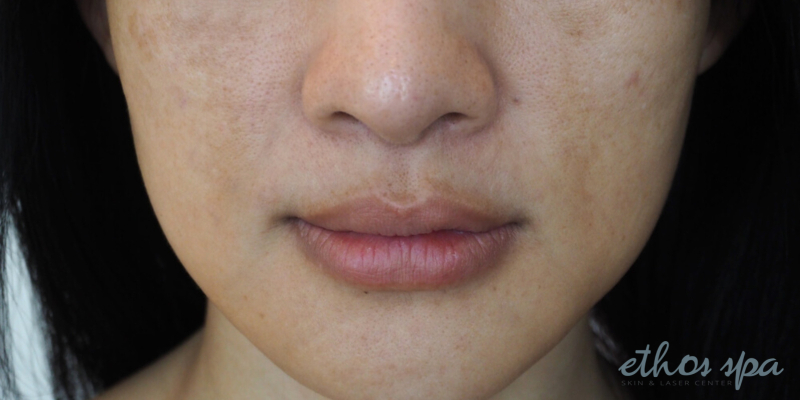Laser technology has transformed modern hair removal procedures; instead of time-consuming shaving or painful waxing, laser hair removal is an efficient method to getting rid of unwanted body hair for a long time. However, the intense heat of laser beams may cause adverse effects on your skin.
So can laser hair removal cause skin darkening? If the laser hair treatment was performed correctly, a risk like skin darkening rarely comes up. However, in unpracticed hands using incorrect machines or settings, the skin may produce dark pigment as a defense mechanism against the heat. Prolonged sun exposure before and after treatment may also cause skin darkening.
Laser Hair Removal and Hyperpigmentation
Before understanding how skin darkening or hyperpigmentation occurs, it’s important to first understand the principle behind laser hair removal. Laser hair removal is a medical procedure that utilizes a concentrated beam of light to remove unwanted hair from specific areas such as the legs, back, armpits, chin, upper lip, and bikini line.
Lasers work by detecting the contrast between unwanted, thick dark hairs and the skin in the background. The laser emits light which is absorbed by a pigment called melanin in the hair; this light energy is converted into heat and destroys the follicles responsible for hair growth. After six sessions and some maintenance treatments, you won’t need to undergo other hair removal procedures like shaving or waxing anymore.
The laser machine works best when there is a big contrast between the hair and the skin since the pigment in the hair follicle absorbs light better. It is ideal if the patient has dark hair and lighter skin. Laser hair removal will not work on patients whose treatment areas are tattooed and patients who have blonde, red, or white hair. Darker-skinned patients can undergo laser hair removal but they need to find a suitable device such as the Nd:YAG laser designed for darker skin types and dark hair.
Hyperpigmentation
While many patients all over the world have experienced no complications due to laser hair removal, some risks have been observed to occur. Skin discoloration is a side effect estimated to happen less than 5% of the time in laser hair removal patients. One form of skin discoloration is hyperpigmentation, which refers to the darkening of the skin.
Hyperpigmentation can either be a temporary or a permanent condition where the skin darkens irregularly due to increased melanin production. It could occur due to one of the following causes:
- Fluctuating hormones
- Underlying medical conditions
- Inflammation or acne
- Skin injury
- Prolonged sun exposure
- Medications such as birth control pills
With laser treatments, hyperpigmentation happens as your skin responds to the laser’s heat. The skin surrounding the hair follicles may become irritated and grow red, acne-like bumps which darken as time goes on. This rare condition is called post-inflammatory hyperpigmentation disorder and commonly occurs on the underarms, legs, and bikini area.
In order to avoid discoloration and hyperpigmentation, it is important to take proper care of yourself before and after each laser session.
3 Ways You Can Protect Your Skin Before Laser Hair Removal
If you find that your skin darkened after a laser hair removal procedure, don’t panic. Most types of hyperpigmentation are temporary and will only last around 1-2 months after the session. Your cosmetic surgeon can help correct or improve the condition by prescribing lightening creams with retinoids, topical scrubs, microdermabrasion, or light chemical peels.
To prevent any mistake from happening that can cause such side effects, here a three ways to protect your skin prior to a laser hair removal procedure:
| Find a qualified professional or practitioner. | It’s crucial to find a practitioner or a physician who has thorough knowledge and training on skin anatomy and laser machines. Usually, a board-certified cosmetic surgeon who is well-trained on dermatology can get rid of your unwanted hairs and maintain the quality of your skin. If another member of the staff will perform the procedure, be sure that a doctor is supervising on-site during the treatment. |
| Ask plenty of questions. | Be wary of spas, salons, and other facilities that won’t respond to questions about the lasers they work with or their qualifications. Some places accept patients even though the patients are not appropriate candidates. Ask if they have already performed laser hair removal on patients with similar hair and skin types to yours. It is also wise to discuss risks, benefits, expectations, and costs so they can draft a fitting treatment plan for you. |
| Practice correct pre-treatment care. | Your skin should be as light as possible prior to your treatment so you should apply plenty of sun screen and avoid sun exposure in the days leading to your appointment. Blood-thinning products like anti-inflammatory medication and alcohol should also be avoided to prevent any adverse effects. |
Ethos Spa: NJ’s Premier Laser Hair Removal Center
At Ethos Spa, our highly-qualified staff have enough expertise to make sure your laser hair removal is safe and effective. Book a consultation with us today so you can build a treatment plan and work with New Jersey’s best.
Learn more: Can Laser Hair Removal Cause Permanent Scarring?







